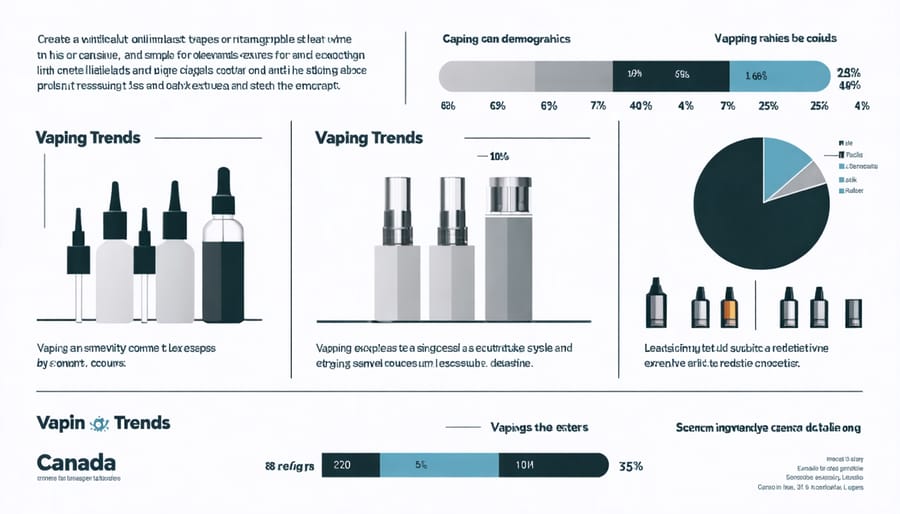In recent years, the vaping industry has experienced unprecedented growth, transforming how people consume nicotine and flavored products. From traditional offerings to innovative varieties like cotton candy vaping juice, the market continues to evolve, raising important questions about public health implications and regulatory frameworks. This comprehensive report examines the current state of vaping in Canada, exploring its impact on healthcare systems, demographic trends, and the crucial role of medical professionals in addressing this emerging public health challenge.
Understanding Vaping: A Public Health Perspective

The Rise of Vaping in Canada
Vaping in Canada has surged markedly over the past decade, with diverse demographic groups contributing to this trend. Recent data indicates that young adults between the ages of 20 and 24 are the most prolific users, with usage rates significantly higher than other age groups. However, new trends are emerging as older adults slowly embrace vaping, often as a cessation tool for smoking traditional cigarettes. Among high school students, there is an alarming increase in vaping uptake, raising public health concerns. This growing rate impacts Canadian healthcare substantially, prompting a need for professionals who understand the nuances of addiction and chronic disease management. For International Medical Graduates (IMGs), this presents unique opportunities to contribute to healthcare solutions and public health strategies. Engaging with mentorship opportunities is crucial in navigating this dynamic field and forging a successful career path in Canada. Embracing these trends can equip IMGs with invaluable knowledge and experience, opening doors to impactful roles within the healthcare system.
Health Implications of Vaping
Vaping, often perceived as a safer alternative to smoking, has been linked to various health risks. Recent studies indicate that e-cigarettes, while potentially less harmful than traditional cigarettes, are not without their dangers. The inhalation of nicotine and other chemicals can impair respiratory function, increase heart rate, and elevate blood pressure, potentially leading to cardiovascular issues. There is also growing evidence suggesting the potential for long-term lung damage and respiratory diseases. These health risks contribute significantly to the burden on healthcare systems, including Canada’s, where resources could be directed towards managing vaping-related illnesses. For International Medical Graduates (IMGs) in Canada, understanding these challenges is crucial, as they provide opportunities to engage with public health initiatives and research on vaping-related health impacts. Emphasizing mentorship, engaging with healthcare professionals focusing on preventive medicine, and exploring community health roles can enhance IMGs’ integration into the Canadian healthcare landscape and support their professional growth.
Impact on the Canadian Healthcare System

Increased Healthcare Demand
The rise in vaping-related illnesses has placed an additional burden on Canadian healthcare facilities, impacting hospitals and clinics already grappling with limited resources. As vaping becomes increasingly prevalent, healthcare providers are encountering a surge in cases linked to e-cigarette use, such as respiratory issues and other serious conditions. For international medical graduates (IMGs) pursuing careers in Canada, this evolving health landscape presents both a challenge and an opportunity. Increased demand for healthcare services calls for innovative approaches to patient care, offering IMGs a platform to demonstrate their skills and adaptability. By engaging with mentoring opportunities, IMGs can gain valuable insights into handling these cases effectively, while also enhancing their understanding of the Canadian healthcare system. This scenario underscores the growing need for professionals who are not only knowledgeable but also proactive in addressing emerging health issues. Through dedication and continuous learning, IMGs can contribute significantly to mitigating the impact of vaping-related illnesses on the healthcare system, thereby paving the way for successful integration into Canada’s medical community.
Economic Costs and Resource Allocation
Vaping poses a significant challenge to the Canadian healthcare system, amplifying economic costs and reshaping resource allocation. For international medical graduates (IMGs) eager to contribute to this landscape, understanding these dynamics is crucial. Vaping-related illnesses and conditions require substantial healthcare spending, diverting resources that could be used for other pressing health issues. This financial strain can impact public health budgeting, emphasizing the need for efficient resource management and innovative healthcare solutions.
As future healthcare leaders, IMGs have the unique opportunity to step into this evolving framework and bring fresh perspectives to tackle these challenges. By engaging in mentorship programs, IMGs can learn from experienced practitioners about resource optimization and cost-effective healthcare delivery in a Canadian context. Success stories of IMGs who have pioneered sustainable healthcare practices can serve as inspiration, demonstrating how challenges can be transformed into opportunities for growth and leadership. Embracing these lessons will not only mitigate the economic impact of vaping on the healthcare system but also empower IMGs to make significant contributions to Canadian public health.
Challenges and Opportunities for IMGs in Addressing Vaping
Educational and Clinical Challenges
International Medical Graduates (IMGs) pursuing careers in Canada face unique educational and clinical challenges, especially when it comes to understanding vaping-related health issues. One key obstacle is the knowledge gap regarding vaping’s diverse health impacts, which constantly evolves with new research findings. IMGs often need to familiarize themselves with both national and regional public health guidelines surrounding vaping, which can differ significantly from their training backgrounds.
Additionally, the clinical practices involved in diagnosing and managing vaping-related health conditions require specific competencies. IMGs may encounter difficulties due to limited exposure or experience with such cases during their previous practice. This underscores the importance of seeking mentorship opportunities within the Canadian healthcare system. Experienced mentors can provide invaluable insights and guide IMGs through the nuances of handling vaping-related conditions.
Encouragingly, many IMGs have successfully navigated these challenges, illustrating that with determination and the right support, integration into the Canadian medical landscape is achievable. Engaging in continuous professional development and actively participating in community health initiatives are practical steps that can help bridge these gaps. By leveraging available resources and learning from peers, IMGs can overcome these educational and clinical hurdles and contribute meaningfully to addressing vaping’s impact on public health in Canada.

Opportunities for Involvement
International medical graduates (IMGs) in Canada have unique opportunities to significantly contribute to addressing the public health concerns posed by vaping. With their diverse backgrounds and medical expertise, IMGs can play pivotal roles in shaping and implementing public health policies that aim to mitigate the adverse health impacts of vaping. By engaging in research, IMGs can help uncover vital insights into vaping-related health issues, informing policy-makers and the public about effective intervention strategies.
Additionally, IMGs can be actively involved in tobacco cessation programs, offering critical support and mentorship to patients looking to quit vaping. By working closely with local healthcare providers and community programs, they can help design and deliver effective cessation strategies, utilizing their cultural competence and experience to tailor these programs to diverse populations. To understand further how they can integrate into Canada’s physician workforce, IMGs can explore resources such as Integrating International Medical Graduates into Canada’s Physician Workforce.
For IMGs seeking a fulfilling career path in Canada, getting involved in these areas not only aligns with public health priorities but also provides opportunities to mentor and support fellow healthcare professionals. By leveraging these opportunities, IMGs enhance their professional growth while contributing meaningfully to the health and well-being of Canadian communities.
Mentorship and Success Stories of IMGs
The Role of Mentorship in IMG Integration
Mentorship plays a crucial role in helping International Medical Graduates (IMGs) successfully transition into the Canadian healthcare system, especially when navigating challenges like those presented by the vaping epidemic. Through mentorship, IMGs gain invaluable insights into the intricacies of Canadian medical practice, including understanding public health issues such as vaping. Experienced mentors can offer guidance on effective patient communication, cultural competencies, and regulatory standards essential for addressing vaping-related health concerns.
By facilitating networking opportunities and sharing professional experiences, mentors help IMGs build confidence and establish their careers within the Canadian context. This support is particularly vital when facing unique challenges associated with vaping, where evolving policies and health risks require nuanced understanding and responsiveness. Additionally, mentorship provides a platform for success stories, exemplifying how IMG integration is achievable and rewarding in Canada. Engaging with established healthcare professionals amplifies the capabilities of IMGs, empowering them to contribute positively to public health and navigate the complexities of their new professional environment.
Success Stories
In recent years, several international medical graduates (IMGs) have significantly contributed to Canadian public health initiatives, particularly in addressing the challenges posed by vaping. Dr. Amina Chen, an IMG from China, has been instrumental in launching a nationwide campaign to educate youth about the risks associated with vaping. Her efforts have led to a 20% reduction in vaping-related incidents among teenagers over the past two years. Similarly, Dr. Raj Kapoor, originally from India, has developed community outreach programs in Vancouver, focusing on prevention and cessation for vulnerable populations. His programs have received positive feedback for their accessibility and impact on reducing vaping addiction. These success stories highlight the important role IMGs play not only in treating patients but also in driving public health innovation. As more IMGs explore opportunities in Canada, these examples serve as a beacon of what dedicated individuals can achieve. For those interested in building a fulfilling career in Canadian healthcare while ensuring IMG wellness, these stories offer inspiration and practical insights.
Conclusion
This article highlights the significant impact of vaping on the Canadian healthcare system and emphasizes how International Medical Graduates (IMGs) can navigate these challenges. Vaping, although seen as an alternative to smoking, poses unique public health challenges, creating demand for healthcare professionals skilled in managing related conditions. For IMGs aiming to practice in Canada, understanding this dynamic landscape is crucial. The evolution of medical practice provides context for how vaping impacts healthcare needs and opportunities for IMGs. Successful integration involves staying informed about public health trends, seeking mentorship from seasoned practitioners, and actively participating in community health initiatives. By equipping themselves with expertise in vaping-related health issues, IMGs not only enhance their professional portfolio but also contribute significantly to Canada’s public health efforts. Continuing education, professional networking, and collaboration across specialties are recommended strategies for IMGs to thrive in their healthcare careers in Canada.







